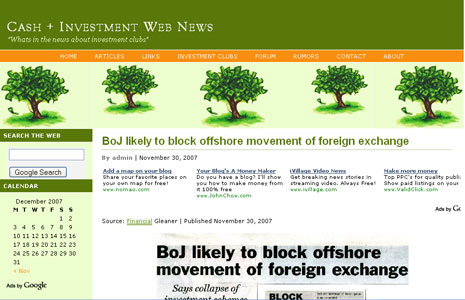 by David Mullings
by David Mullings
I attended a Jamaica Investment Symposium yesterday in South Florida and one panel included George Roper, Deputy Director of the Financial Services Commission (FSC) and Antoinette McKain, CEO of the Jamaica Deposit Insurance Company (JDIC).
The audience wasted no time during the Q&A segment to ask the questions many want answers to. The first question was roughly:“I don’t like the word ‘schemes’ to describe these, I call them ‘opportunities’. Are these ‘opportunities’ operating illegally and if so, then shut them down, if not, leave them alone.” The answer was very clear – The FSC pointed out that it describes Credit Unions as “collective investment schemes”, there is no negative connotation with the word “scheme” when they describe any financial company.
More importantly, he pointed out that those schemes that have not applied for licenses are operating illegally based on present Jamaican law and even would be in violation in the USA. He explained that the USA has a law stating that investment clubs are defined based on a maximum participation of people where every person is involved in the decisions regarding investments.
The exact definition, according the to SEC section on their website – Investment Clubs and the SEC is below:An investment club is a group of people who pool their money to make investments. Usually, investment clubs are organized as partnerships and, after the members study different investments, the group decides to buy or sell based on a majority vote of the members.
An investment club must register with the SEC as an investment company under the Investment Company Act of 1940 if all of the following three conditions apply:1. the club invests in securities,2. The club issues membership interests that are securities (see above), and3. The club is not able to rely on an exclusion from the definition of investment company.
For example, a “private investment company” may not need to register with the SEC. To qualify, an investment club* must not make, nor propose to make, a public offering of its securities, and* must not have more than 100 members.He also pointed out that Jamaica in fact has no such exemption related to the size of the club. Clearly an “investment club” like OLINT, with far more than 100 members and no voting on investment decisions, would be required to register with the SEC in the USA and there is no difference for operations in Jamaica.
He made sure to point out that the FSC did in fact issue a cease and desist letter and that the matter was appealed and they await the court ruling in early December. They only have the power to issue the letter and turn over the matter to the Director of Public Prosecutions (DPP). The FSC cannot simply “shut them down”.He also went on to explain why other “extremely high yield” schemes like Cash Plus had only three options to be in compliance with the law. Any company or entity that is selling a security has to be licensed and the people selling that security to the public also have to be licensed.
In the FSC new release on Cash Plus on May 4, 2007 – http://www.fscjamaica.org/publicinfo_files/bulletins/News release Cash Plus.pdf – the FSC defined “securities”
“Securities” include stocks, bonds, promissory notes, certificates of participation in profit sharing agreements, investment contracts and documents commonly known as securities.Cash Plus and others have 3 options* Register and use licensed securities dealers (or have dealers licensed)* Sell their securities through a licensed 3rd party* Shut downIt is interesting that those who seek to say that the FSC is “badmind” or that the financial institutions are conspiring against these schemes are the least knowledgeable on the subject and have not sought to educate themselves about Jamaican law, or even understand how the US‘s SEC would treat these schemes.Maybe the information above will have some material impact on the discussion.
For more Make Money Online stories go to our sister site cashingcoconuts.com

 eCommerce1 year ago
eCommerce1 year ago
Pingback: Jamaica’s alternative Investment Schemes would be illegal in the USA : Cashing Coconuts